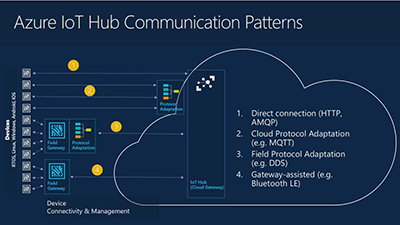Microsoft Provides New Services for the Internet of Things
The Azure IoT Hub is specifically aimed at addressing connectivity issues.
The Internet of Things (IoT) is everywhere, including in Microsoft's cloud. And now, it's been more tightly integrated with Azure.
Last week the company commercially released its Azure IoT Hub set of services, which facilitates Internet of Things (IoT) operations for organizations.
Azure IoT Hub is part of Microsoft broader range of services known as the "Azure IoT Suite," which is a set of solutions that provides configurable templates for remote monitoring, asset management and predictive maintenance of devices. The Azure IoT Suite hit general availability commercial release back in September, but the Hub portion apparently lagged somewhat.
Azure IoT Hub specifically falls under Azure's "IoT analytics" segment, according to a Microsoft video. It's a middleware component of Microsoft's broader IoT vision, which sees signals data getting harvested from devices of all sorts. The data can then be collected to support business intelligence analyses or carry out "predictive maintenance" by anticipating trouble with industrial devices, Microsoft has suggested.
Azure IoT Hub is a collection of Microsoft-managed services for provisioning and bootstrapping devices. It enables bidirectional communication paths for devices.
Azure IoT Hub is specifically aimed at addressing connectivity issues, according to Microsoft's documentation. It has device libraries to support various protocols. A public protocol can be created using the Azure IoT Hub to support MQTT 3.1.1, HTTP 1.1 or AMQP 1.0 open protocols. Custom protocol support also can be added using a gateway, which can be run either in a public cloud datacenter or on premises, Microsoft's documentation explains.
Microsoft conceives of Azure IoT Hub as being a fairly technology-agnostic support solution. Organizations can do whatever they want with it, except for the identity and security components, which Microsoft has locked down, according to an explanation by Ulrich Homann, a distinguished architect for Microsoft's Cloud and Enterprise business, during a November Ignite Australia session. Azure IoT has a device registry and it requires the use of certificates for security, he said.
Azure IoT Hub supports device-to-cloud telemetry, as well as cloud-to-device commands and notifications, Homann said. While gateway support is built into Windows 10, Homann said that Microsoft is not focused on getting its customers to use that particular operating system. He said that Microsoft is acting as a general solutions shop with Azure. Azure IoT Hub has programming language support for C, Java, .NET and JavaScript.
Azure IoT Hub is all about device connections and protocols. Direct connections, cloud protocol adaptations, field protocols and gateway-assisted protocols are supported:
 [Click on image for larger view.]
Communication protocol support in Azure IoT Hub. Source: Ignite Australia session.
[Click on image for larger view.]
Communication protocol support in Azure IoT Hub. Source: Ignite Australia session.
Management protocol support is also part of the service. Azure IoT Hub has support for OMA, LWM2M, OPC UA, OMA DM, CoAP, AllJoyn, Thread and TR-069, among others. Homann said that the Lightweight Machine to Machine (LWM2M) protocol is high on Microsoft's list for standards support.
Microsoft also has a partner program associated with its Azure IoT efforts. The Microsoft Azure Certified for IoT program aims to bolster device interoperability proactively. The program has expanded in the last three months, Microsoft noted. Notable new participants include "Advantech, Dell, HP and Libelium," among others. They join early participants such as "Arduino, Beagleboard, Freescale, Intel, Raspberry Pi, Samsung and Texas Instruments."
About the Author
Kurt Mackie is senior news producer for 1105 Media's Converge360 group.